FANUC Scholarship Supports Industry, Educators, and Students
December 11, 2024
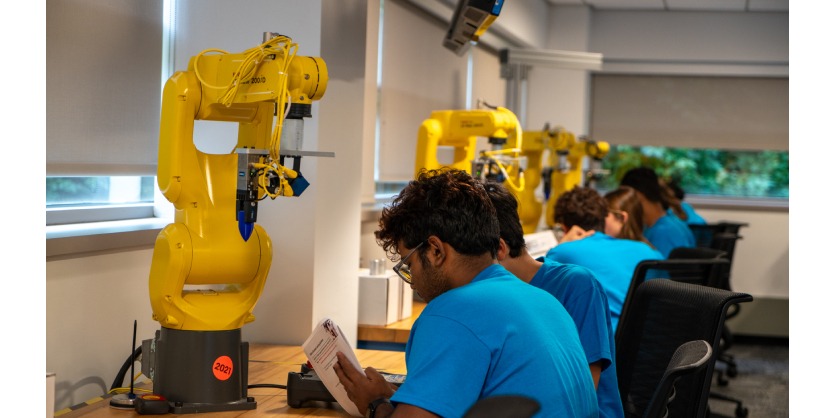
By Krystie Johnston
FANUC’s $1 Million Scholarship fund will provide $50K annually to students across the United States and Canada pursuing careers in manufacturing and automation.
FANUC has always believed in the power of education and its importance in shaping the future. As leaders in education, their Certified Education program connects industries, educators, and students to support the future of automation and robotics. Paul Aiello has been with the company for more than 25 years and spent the last 15 of them as the Executive Director of Education at FANUC America. In this role, he has managed their education initiatives that includes partnerships with over 1, 600 schools, ensuring curriculum aligns with the needs of employers.
Building a Pipeline of Skilled Workers Aligned with Industry Needs
Aiello explains that these partnerships with the schools ensure alignment with industry, and that what is taught to students is directly related to what employers are looking for in terms of current and emerging talent. To accomplish these objectives, FANUC provides the same curriculum to the schools that they do to their own customers via the FANUC Training Academy, which teaches foundational robotics and automation skills to an average of 8,000 students a year, who then build up their abilities in the workplace.
“There is parity between what is being taught in an academic environment and what is being taught directly in industry training. So, there is high value for those students coming out of these programs that are learning the skills that are needed today,” he says.
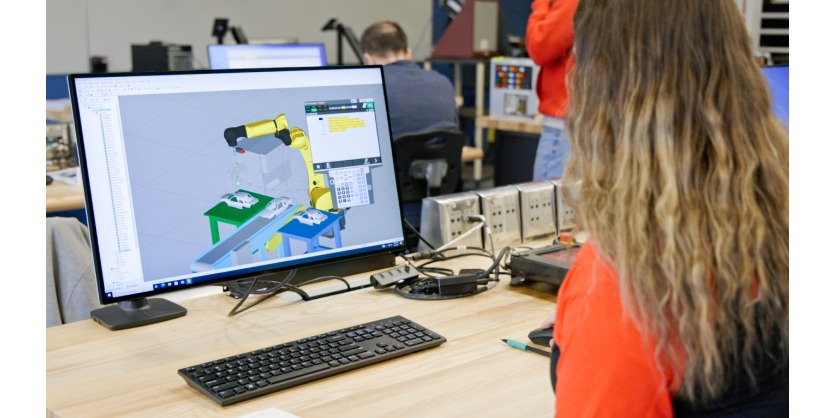
FANUC, through its education solution providers, works with schools to provide training and software valued at hundreds of thousands of dollars. To start, FANUC trains and certifies the teacher on how to teach the curriculum and use the technology. The curriculum they provide consists of an e-learning component that sets the groundwork for automation and robotics, simulation software that teaches students how to virtually program the robot via a digital twin, and lab exercises where they physically engage with the robot.
“We teach all the schools how to use a robot for doing what we call ‘handling tool,’ but it is a material handling function. It is how to do picking, packaging, palletizing, or loading and unloading with the robot. They learn how to program the robot, how to control inputs and outputs, how to do macros, and all the different things you need to learn about a robot for material handling,” says Aiello. He adds that about half of the applications for robots and automation involve material handling of some sort, and this training gets students ready for these applications.
“But if they go out into industry and somebody is welding or painting or dispensing, it is all the same. The difference is in the nomenclature.” Aiello says that for material handling, the nomenclature is essentially, “Gripper ON, Gripper OFF,” or “Vacuum ON, Vacuum OFF.” The nomenclature for a welding application is slightly different, “Arc ON, Arc OFF,” or for painting applications, is “Spray ON, Spray OFF,” but the motion and programming of the robot does not change.
“Somebody can make that leap from material handling to another application very seamlessly, but that allows us to standardize how we work with the school so that students get the most valuable skill set that will abridge to just about any industry out there.”
Bridging Gaps Along the Pathway to Working with Automation and Robotics
Building on their experience of training and supporting the next generation of advanced manufacturing, FANUC is bridging financial gaps that students may have on their pathway to a career in automation and robotics.
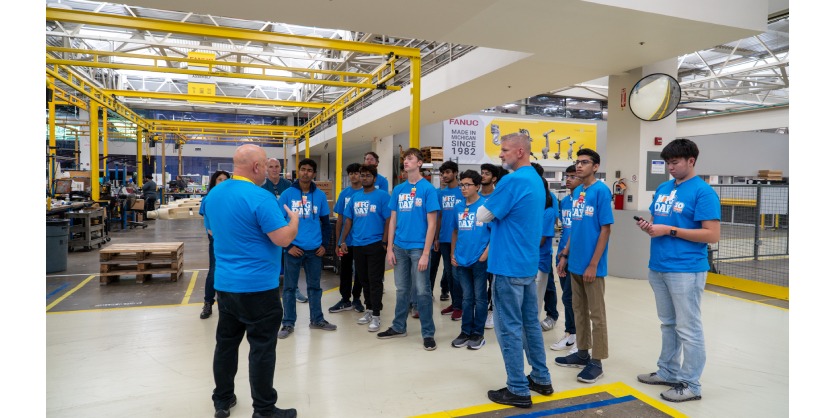
“There is a tremendous need in industry for people at the operator or technical level. And there are a tremendous number of programs out there for scholarships for engineers, and businesses. But there is not a lot of funding immediately available for someone who says, ‘I just want to pursue a one-year certificate or two-year degree.’ We wanted to focus on that, because that is what our customers, who are our employer, are saying. They cannot find enough people in that technical space that are even trying to get into manufacturing.”
Aiello says that the FANUC Automation Endowment Scholarship Fund is part of the solution. They are already helping students prepare for work in the automation industry, the next step is helping them pay for it. He says they considered different funding options, and eventually decided to work with the SME (formerly the Society of Manufacturing Engineers) and their Education Foundation. The SME has been a leader in supporting the next generation of manufacturing and engineering talent around the world for the last 40 years, and Aiello says he was impressed with their track record of managing scholarships.
When FANUC approached SME Education Foundation, they asked how the company would like to fund the scholarship, suggesting a lump sum that would cover one student and renew each year. Our response was, ‘We need to think a lot bigger. What would it take to get a scholarship in an endowment going, and how do we have this so that it lives on into perpetuity?”
The answer was more than $1,000,000.
Three Legs of a Stool
Aiello says FANUC’s leadership was on board, but they saw an opportunity to further engage their systems integrators. They reached out to their community of systems integrator partners and education solution providers and invited them to participate in the initiative. “We have a well established authorized system integrator networkacross the Americas that utilize our robots. They do the integration to solve a customer’s challenge; they are also struggling with talent. We have our education solutions providers that work exclusively with schools, and all of them chipped in,” Aiello says. “With this level of involvement, we’ve exceeded our timeline to meet these goals.”
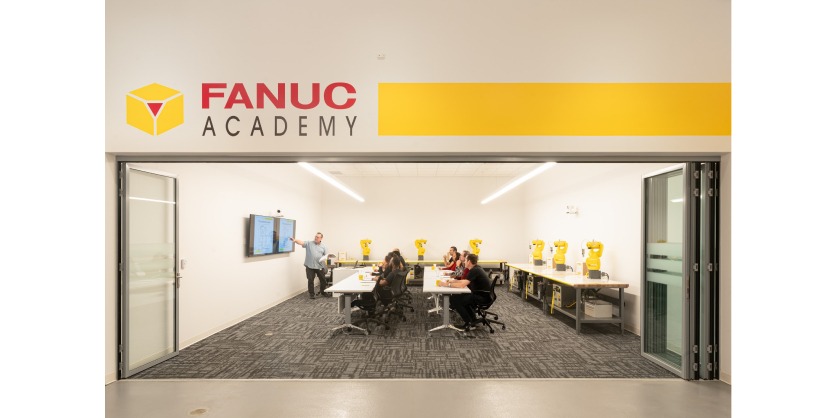
Their achievement means that the FANUC Automation Endowed Scholarship Fund is available to anywhere from 25 to 50 students across the U.S. and Canada on an annual basis and is opening new opportunities for students to train in advanced manufacturing. A high school student, for example, who wants to go into robotics or automation can follow a technical path and apply for funding.
Another student who wants to do a four-year degree could apply for funding for their first two years of community college and go on to university to finish their degree. Any student who has a desire to go into some sort of advanced manufacturing or robotics career can apply. There is no requirement to have prior robotics training, which is beneficial to students who may not have had that experience in high school.
There are many rewards to a career in automation and robotics including job security and high wages. Aiello says the demand for these careers is only going to increase. “We call it the multiplier effect. For every automated system we install, we create about four to five new manufacturing jobs,” he says. Automating a task may replace a job that was dull or dirty but replacing that position with a robot requires an integrator to put it in, a PLC from a manufacturer, safety devices, and other ancillary components, and it elevates that worker to do high-level tasks. “All those companies are growing because automation is expanding. And there are so many career opportunities and career tangents.”
Aiello says that he sees FANUC as one leg of a stool supporting automation and robotics. “Industry has a role. They have to tell us what skills and talents they need today, or what they think they are going to need as they are deploying new or emerging technologies. We have a role to play as a technology supplier, to make sure that people understand how to use that technology in these applications. And the educational system has to move at the speed of business, because this technology changes, and they have to be engaged with us to keep up with those changes. There is a role for everybody.”
FANUC’s new Automation Endowed Scholarship Fund
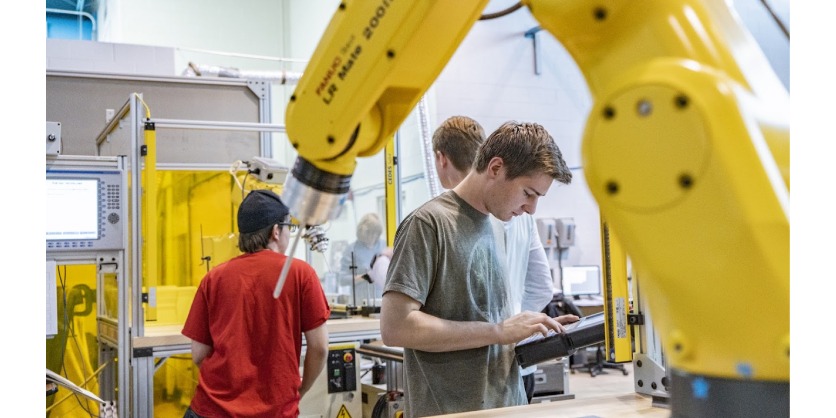
Applying for the new scholarship is incredibly easy. FANUC and the SME Education Foundation streamlined the process with a single-page scholarship application that automatically submits a student’s application to other SME scholarships if they meet the requirements. Students from across Canada and the U.S. can submit applications between November 1, 2024, and February 1, 2025.
More Information
Find out more or apply here.
Related Story
FANUC Canada Celebrates Grand Opening of New Headquarters
In a grand opening and ribbon cutting ceremony, FANUC unveiled its new Canadian Headquarters in Mississauga, Ontario to industry partners, customers and media on November 21. The new facility, which will serve as a hub for cutting-edge robotics technology, hosted over 250 attendees in a celebration that included remarks from company leadership and advanced technology demonstrations.




